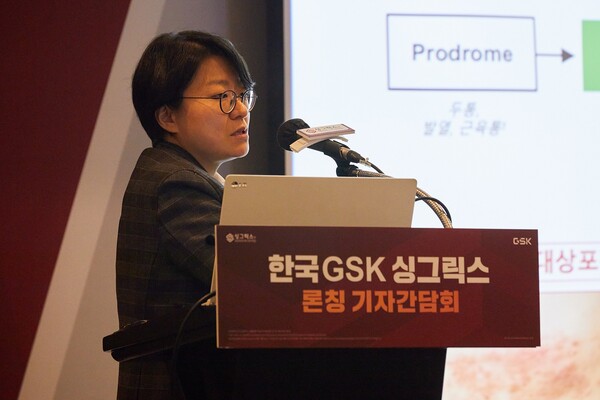With the increasing incidence of shingles in Korea due to the rapid population aging, GSK Korea said it would release Shingrix, a new vaccine that prevents shingles with over 90 percent efficacy.
The company held a press conference Thursday to celebrate the upcoming launch of the new vaccine.
Shingles are caused by the reactivation of the varicella-zoster virus (VZV) that causes chickenpox.
The shingles’ symptoms usually start like a cold. Then, blisters appear on the body, and various complications such as postherpetic neuralgia or facial paralysis occur.
If the ocular nerve or cranial nerve is invaded by the virus, it causes serious diseases such as vision loss or nervous system meningitis, which may lead to death.
Also, if chronic pain appears as a complication after shingles, the quality of life may worsen due to sleep disturbance and difficulty carrying a normal daily life.
While the incidence rate of shingles is increasing in Korea, the prevention rate of the existing shingles vaccines was only 70 percent in adults over 50 and 51 percent in those over 60.
The conventional vaccines’ efficacy also drops to about 21 percent 10 years after immunization.

Professor Yoon Young-Kyung of the Department of Infectious Diseases at Korea University Anam Hospital, who introduced the disease burden of shingles during the press conference, emphasized that prevention is the best option because, after the onset of shingles, only pain-mitigating treatment is possible.
"Existing vaccines have a lower protection rate in the elderly and a lower protection rate over time," Yoon said. "Notably, it was contraindicated for severely immunocompromised patients, for whom shingles prevention is the most important factor."
Yoon stressed that the launch of Shingrix is the first and only recombinant inactivated vaccine in Korea that has proven its preventive effect and safety profile through global clinical studies, and it will present a new paradigm for the prevention of shingles in Korea.
During the press conference, Kim Hyung-woo, GSK's vaccine medical director, explained the ZOE 050 and ZOE 070 trials that led to the approval of Shingrix.
"In the two global phase 3 clinical trials conducted on 15,411 adults aged 50 years or older, Shingrix showed a 97.2 percent preventive effect," Kim said. "Notably, the vaccine showed more than 90 percent prevention rate for those over 70."
Serious adverse reactions were similar between the Shingrix-treated and placebo-treated groups, Kim added.
Kim also stressed that through an interim analysis of ZOSTER-049 (ZOE-LTFU), which was conducted as an extension study of ZOE-50 and ZOE-70, GSK confirmed that Shingrix's shingles preventive effect lasted for at least a decade after the initial vaccination.
"In addition, Shingrix confirmed its safety profile for immunosuppressed patients over the age of 18 through several trials," Kim said. "Based on study results, Shingrix vaccination can be given to immunocompromised patients such as autologous hematopoietic stem cell transplant recipients, patients with solid cancer, blood cancer, and solid organ transplant who are at higher risk of shingles compared to the general population."
Related articles
- GC to co-market GSK's shingles vaccine
- Shingles warning issued to adults 50 and older infected by Covid-19
- Korean demand for GSK's Shingrix weaker than expected: dermatologists
- GC Biopharma scores third WHO PQ for chickenpox vaccine
- Will SK Bioscience maintain No. 1 shingles vaccine seller position in 2023?
- Zoster vaccination proves lower shingles risk post kidney transplant: study
- Number of shingles patients topped 720,000 in 2021
- 'GSK's immunotherapy Jemperli paves way for 2nd-line endometrial cancer treatment'

